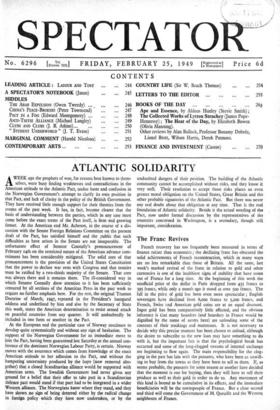ATLANTIC SOLIDARITY
AWEEK ago the prophets of woe, for reasons best known to them- selves, were busy finding weaknesses and contradictions in the American attitude to the Atlantic Pact, undue haste and confusion in the Norwegian Government's attempt to clarify its own position in that Pact, and lack of clarity in the policy of the British Government. They have received little enough support for their theories from the events of the past week. It has, in fact, become clearer that the basis of understanding between the parties, which in any case must come before the exact terms of the Pact itself, is firm and growing firmer. At the American end Mr. Acheson, in the course of a dis- cussion with the Senate Foreign Relations Committee on the present draft of the Pact, has satisfied himself and the public that such difficulties as have arisen in the Senate are not insuperable. The unfortunate effect of Senator Connally's pronouncement of February r4th on the restricted nature of the American advance com- mitment has been considerably mitigated. The solid core of that pronouncement is the provision of the United States Constitution that the power to declare war rests with Congress and that treaties must be ratified by a two-thirds majority of the Senate. That core was always there and it remains there. The ill-considered way in which Senator Connally drew attention to it has been sufficiently censured by all sections of the American Press in the past week to require no further emphasis here. For the rest, the original Truman Doctrine of March, 1947, repeated in the President's inaugural address and underlined by him and also by the Secretary of State this week, states the American determination to resist armed attack on peaceful countries from any quarter. It will undoubtedly be included in one form or another in the Pact.
At the European end the particular case of Norway continues to develop quite systematically and without any sign of hesitation. The support of the Norwegian Government for an immediate move to join the Pact, having been guaranteed last Saturday at the annual con- ference of the dominant Norwegian Labour Party, is certain. Norway moves with the assurance which comes from knowledge of the exact American attitude to her adhesion to the Pact, and without the hampering uncertainty produced by the hope (now removed alto- gether) that a closed Scandinavian alliance would be supported with American arms. The Swedish Government had never given any ground for a belief that their offer to take part in a Scandinavian defence pact would stand if that pact had to be integrated in a wider Western alliance. The Norwegians know where they stand, and they have shown no sign of being deterred either by the radical change in foreign policy which they have now undertaken, or by the undoubted dangers of their position. The building of the Atlantic community cannot be accomplished without risks, and they know it very well. Their resolution to accept those risks places an even greater moral obligation on the United States, Great Britain and the other probable signatories of the Atlantic Pact. But there was never any real doubt about that obligation at any time. That is the real foundation of Atlantic solidarity. Beside it the actual wording of the Pact, now under formal discussion by the representatives of the countries concerned in Washington, is a secondary, though still important, consideration.


































